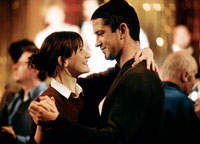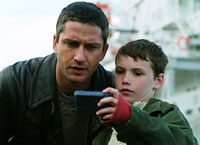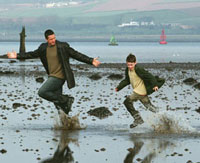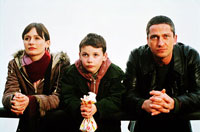 |
Dear Frankie is such a charming little film, and it grows on the viewer so gradually and has some nice little surprises to boot, that I am almost inclined to say, “Just see it first, and then we’ll talk.” However, that wouldn’t satisfy my editors, so review it I shall.
The film is about a woman named Lizzie (Emily Mortimer) who moves to Glasgow with her deaf 9-year-old son Frankie (Jack McElhone) and her chain-smoking mother Nell (Mary Riggans). We gather early on that Lizzie and her family have moved often. Frankie, in one of many letters that he writes to the absent father he never knew, explains to his Da—Frankie’s pet name for his dad—that Grandma said another move would kill her, to which Ma replied, “Don’t tempt me.”

Why the family keeps moving, and why Frankie’s father has been away for so long, are not explained at first, but we sense there is an unusual story behind this. It could hardly be more unusual than what we do know, though. We soon learn that all of Frankie’s letters are received and answered not by his father, but by his mother. Frankie thinks his father is on a boat called the Accra, which has been sailing the world for years, but in fact, all his letters have been going to a post-office box set up by Lizzie because, as she puts it, reading Frankie’s letters is the only way that she can hear his voice. Since it is not too hard to think of other ways that she could have encouraged Frankie to write his thoughts down for her, she may have other motives as well. For example, when writing to Frankie, she tells him to listen to his mother, and this may allow her to pretend for a bit that she has the support of another parent; and of course, deep down, she may sense that her boy needs a father.

Lizzie’s scheme hits a snag soon after the family settles in Glasgow. It turns out there really is a ship called the Accra, and it is due to dock there in the very near future. One of Frankie’s classmates bets him his father won’t even pay him a visit. Frankie takes the bet, and when Lizzie hears of it, through one of Frankie’s letters, she decides the only way out of this predicament is to hire a man to pretend to be Frankie’s dad, just for one day.
On paper, this may sound like the contrived set-up for a badly written, wildly implausible, yet somehow formulaic melodrama. But director Shona Auerbach, making her first feature film from a script by Andrea Gibb, is much more interested in character, mood and tone than mere plot twists. She does not push the implausibilities more than she has to, and she builds the relationships between her characters in a subtler, more organic way. She also shows a remarkable economy with words and gestures. When Lizzie and Frankie first meet Marie (Sharon Small), owner of the local fish-and-chips shop, Marie remarks that Frankie is “a smart wee cookie.” Lizzie, defensively, says, “For a deaf kid?” Marie, without any hesitation, replies, “For his age.” And with that, we get a glimpse of Lizzie’s protectiveness and inability to trust, as well as Marie’s good-natured, clear-eyed candor.

So, Lizzie goes looking for a man. But where to find him? She tries a local bar, but it looks menacing, so she flees the place and spends her evening crying on a bench. There she is found by Marie, who promises to help her out by hooking her up with a male friend of hers who will be in town for just a few days. That man, known only as The Stranger—because Lizzie does not want to know anything about him—is played by Gerard Butler, last seen singing and skulking about the sewers of Paris in The Phantom of the Opera, and he brings a rugged charisma and integrity to the role. At first he seems to look down on Lizzie for deceiving her son and resorting to such schemes, but as he gets to know her better—and as we learn more about why Lizzie lives the way she does—that begins to change.
Frankie, for his part, takes to his “father” immediately. Frankie loves aquatic animals—he refuses to eat fish, which prompts Marie to call him “a vegetarian who won’t eat his vegetables”—and The Stranger, who has read all of Frankie’s letters to prepare for this gig, wins the boy’s heart in a way he didn’t foresee, simply by giving him a book on marine life at their first meeting.

If you’re like me, you may dread a certain moment that always seems to come in films like this. Whenever a film is built around someone deceiving someone else, there always comes a point about 20 to 30 minutes before the end where the fib is exposed and someone expresses his or her outrage with the words, “You lied to me!” Thankfully, that does not happen here, and this is one of many reasons why I really like this film. (I also like the way the film occasionally introduces Marie in a way that hints she may be a possible destabilizing or corrupting influence in Lizzie’s life—which would have obvious implications for The Stranger—only to turn around and show how safe and stabilizing she really is.)
I won’t say how Dear Frankie gets around the “You lied to me!” convention, but I will say that, the first time I saw this film, at a festival seven months ago, I thought it had “cheated” a bit at the end; however, the second time I saw it, at a preview screening this month, I realized the character interactions had been a bit more complex all along than I had noticed at first, and there may not have been that much cheating after all. (I could point to a specific scene here, but if I did, I might give too much away.) Thanks to some wonderfully open-ended, even mysterious writing and acting, and thanks to Auerbach’s fine attention to detail, Dear Frankie is one of those rare films that rewards repeat viewing.
Talk About It
Discussion starters- Have you ever told someone a lie, or helped tell someone lie, to protect them? Do you think lies are always unacceptable, or can there be such a thing as a “good” lie?
- Why do you think it is so difficult for Lizzie to trust people? Given that she has been hiding the truth from her son all these years, do you think she trusts her own son? Do you think she will learn to trust him in the end? How does the film’s gradual revelation of the various characters’ secrets affect our own ability to trust them?
- How important is it for children—girls as well as boys—to have fathers or father figures? Do you think The Stranger is a good father figure? Why or why not? Do you think Frankie can tell that The Stranger is not his real father? If so, then how do you think he figured it out?
The Family Corner
For parents to considerDear Frankie is rated PG-13 for language, though there isn’t much of it, apart from a scene in which a bedridden man speaks abusively to his wife.
Photos © Copyright Miramax Films
What Other Critics Are Saying
compiled by Jeffrey Overstreetfrom Film Forum, 03/24/05Always on the move, nine-year-old Frankie and his single mom Lizzie settle in a Scottish town. Lizzie doesn’t want Frankie, who is deaf, to discover that they’re fleeing from his father. She writes fake letters to convince him that his father is out having wild adventures at sea. When Frankie sees an opportunity for a rendezvous, Lizzie must decide whether or not to tell him the awful truth.
That’s the setup for Dear Frankie, a film starring the talented Emily Mortimer (Lovely and Amazing, Young Adam). The film, making its way to art house theatres around the country, is earning some of the best reviews from Christian press critics all year.
Annabelle Robertson (Crosswalk) said she expected “a rather syrupy story that overflowed with contrivances and schmaltz.” She discovered something entirely different. “Dear Frankie is a wonderful film that conveys great truth about the human heart and the burning need we all have for a father. A worthy, worthwhile movie of great merit.”
Harry Forbes (Catholic News Service) calls it “an immensely appealing film. Some minor plot improbabilities aside, the story—and certainly the emotions—ring heartrendingly true. The ending is satisfying, and avoids the expected denouement. This is superlative entertainment for adults and older adolescents.”
Peter T. Chattaway (Christianity Today Movies) blogged about the movie at Film Chat: “Dear Frankie is a modest but charming film. [It has a] somewhat contrived set-up, but once you swallow it, the rest of the film goes down pretty easy. The film, which was written, directed, and produced by women, definitely has the feel of a crowd-pleaser, but it doesn’t push our buttons too hard. I liked it.”
Mainstream critics are mulling it over, generally pleased.
from Film Forum, 05/05/05Peter T. Chattaway’s review (Christianity Today Movies) begins in a most persuasive manner: “Dear Frankie is such a charming little film, and it grows on the viewer so gradually and has some nice little surprises to boot, that I am almost inclined to say, ‘Just see it first, and then we’ll talk.’ However, that wouldn’t satisfy my editors, so review it I shall.” He concludes, “Thanks to some wonderfully open-ended, even mysterious writing and acting, and thanks to [director Shona] Auerbach’s fine attention to detail, Dear Frankie is one of those rare films that rewards repeat viewing.”
Copyright © 2005 Christianity Today. Click for reprint information.












